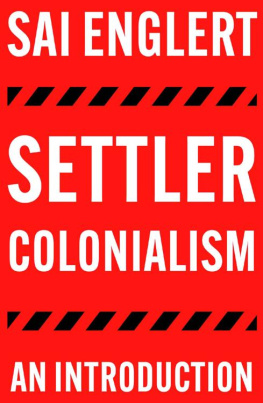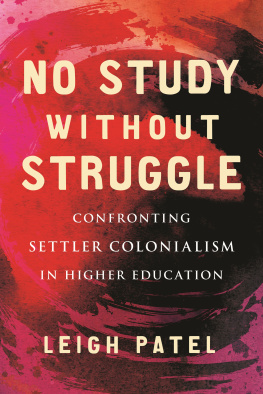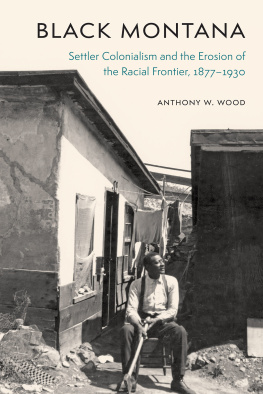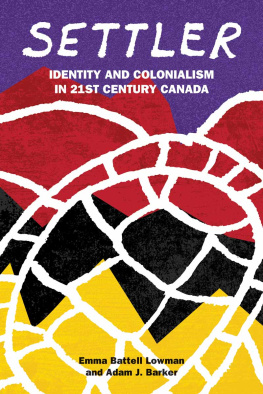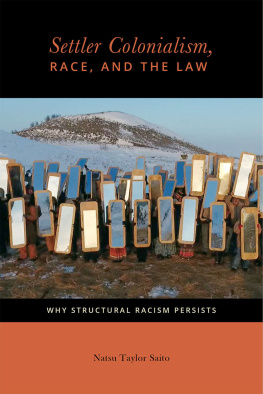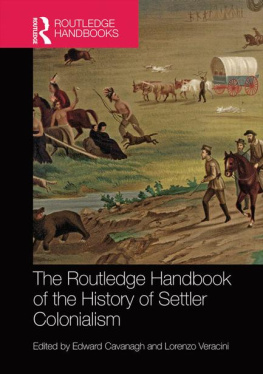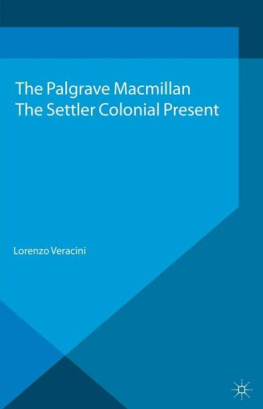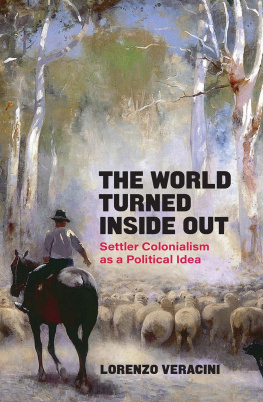Veracini - Settler Colonialism
Here you can read online Veracini - Settler Colonialism full text of the book (entire story) in english for free. Download pdf and epub, get meaning, cover and reviews about this ebook. year: 2010, publisher: Palgrave Macmillan UK, genre: Politics. Description of the work, (preface) as well as reviews are available. Best literature library LitArk.com created for fans of good reading and offers a wide selection of genres:
Romance novel
Science fiction
Adventure
Detective
Science
History
Home and family
Prose
Art
Politics
Computer
Non-fiction
Religion
Business
Children
Humor
Choose a favorite category and find really read worthwhile books. Enjoy immersion in the world of imagination, feel the emotions of the characters or learn something new for yourself, make an fascinating discovery.

Settler Colonialism: summary, description and annotation
We offer to read an annotation, description, summary or preface (depends on what the author of the book "Settler Colonialism" wrote himself). If you haven't found the necessary information about the book — write in the comments, we will try to find it.
Settler Colonialism — read online for free the complete book (whole text) full work
Below is the text of the book, divided by pages. System saving the place of the last page read, allows you to conveniently read the book "Settler Colonialism" online for free, without having to search again every time where you left off. Put a bookmark, and you can go to the page where you finished reading at any time.
Font size:
Interval:
Bookmark:

Settler Colonialism
Also by Lorenzo Veracini
ISRAEL AND SETTLER SOCIETY
Settler Colonialism
A Theoretical Overview
Lorenzo Veracini
Queen Elizabeth II Fellow, Institute for Social Research, Swinburne University of Technology, Melbourne


Lorenzo Veracini 2010
All rights reserved. No reproduction, copy or transmission of this publication may be made without written permission.
No portion of this publication may be reproduced, copied or transmitted save with written permission or in accordance with the provisions of the Copyright, Designs and Patents Act 1988, or under the terms of any licence permitting limited copying issued by the Copyright Licensing Agency, Saffron House, 6-10 Kirby Street, London EC1N 8TS.
Any person who does any unauthorized act in relation to this publication may be liable to criminal prosecution and civil claims for damages.
The author has asserted his right to be identified as the author of this work in accordance with the Copyright, Designs and Patents Act 1988.
First published 2010 by
PALGRAVE MACMILLAN
Palgrave Macmillan in the UK is an imprint of Macmillan Publishers Limited, registered in England, company number 785998, of Houndmills, Basingstoke, Hampshire RG21 6XS.
Palgrave Macmillan in the US is a division of St Martins Press LLC, 175 Fifth Avenue, New York, NY 10010.
Palgrave Macmillan is the global academic imprint of the above companies and has companies and representatives throughout the world.
Palgrave and Macmillan are registered trademarks in the United States, the United Kingdom, Europe and other countries.
ISBN 978-0-230-22097-3 hardback
ISBN 978-0-230-28490-6 paperback
This book is printed on paper suitable for recycling and made from fully managed and sustained forest sources. Logging, pulping and manufacturing processes are expected to conform to the environmental regulations of the country of origin.
A catalogue record for this book is available from the British Library.
Library of Congress Cataloging-in-Publication Data Veracini, Lorenzo.
Settler colonialism: a theoretical overview / Lorenzo Veracini.
p. cm.
ISBN 978-0-230-22097-3 (hardback)
1. ColoniesHistory. 2. Land settlementHistory. I. Title.
JV105.V35 2011
325.3dc22 2010034610
10 9 8 7 6 5 4 3 2 1
19 18 17 16 15 14 13 12 11 10
Printed and bound in Great Britain by
CPI Antony Rowe, Chippenham and Eastbourne
Contents
List of Figures
Acknowledgements
This research was supported under Australian Research Councils Discovery Projects funding scheme (project number DP0986984). This support was seriously enabling; without the fellowships the Council provided, researching and writing this book would have been impossible. Many in my generation had to leave Italy to find opportunities and dignity elsewhere. I was lucky and ended up in Australia. At the same time, Australia is also a great place to get to know about settler colonialism.
Part of will appear in Thinking Settler Colonialism: Essays on Settler Colonialism and its Consequences (Palgrave Macmillan). The jacket reproduces a painting by William Ludlow Sheppard entitled Wives for the Settlers at Jamestown (1876). I believe this painting identifies the moment when colonialism turns into settler colonialism. The cover image is reproduced with permission from the New York Public Library.
And I want to thank the shower for a number of decent ideas that came up while I was having one. Had we not had water restrictions all along, this book would have probably been a better one. Blame climate change.
Introduction: The Settler Colonial Situation
The expectation that every corner of the globe would eventually become embedded in an expanding network of colonial ties enjoyed widespread currency during the long nineteenth century. A theoretical analysis of what is here defined as the settler colonial situation could perhaps start with Karl Marx and Friederich Engels remark that the need of a constantly expanding market for its product chases the bourgeoisie over the whole surface of the globe, and that it must nestle everywhere, settle everywhere, establish connections everywhere. Sometimes capable of displacing established colonial traditions, more rarely giving way to other colonial forms, settler colonialism operated autonomously in the context of developing colonial discourse and practice.
Another point of departure for this analysis could be Charles Darwins voyage, which, as well as an exploration into the evolution of the species, was also a journey into what had become a geographically diversified system of intertwined colonial forms. On the issue of settler colonialism, he had specifically noted in 1832 that the Argentinean war of extermination against the Indians, an episode he had personally witnessed during his voyage, was too much.
The Indians are now so terrified that they offer no resistance in a body, but each flies, neglecting even his wife and children; but when overtaken, like wild animals they fight, against any number to the last moment. [ ] This is a dark picture, but how much more shocking is the undeniable fact that all the women who appear above twenty years old are massacred in cold blood! When I exclaimed that this appeared rather inhuman, he [general and temporarily out of office national leader Juan Manuel de Rosas] answered Why, what can be done? They breed so.
Personal dispositions are often surprising. Whereas one could argue that (especially the later) Marx was not a Marxist in suggesting that traditional, indigenous, and colonised societies could follow historical trajectories that did not necessarily reproduce the evolution of the metropolitan cores, at the same time, one could maintain that Darwin was not a (social) Darwinist when he regretted the deliberate targeting of the reproductive capabilities of the indigenous community and the horror intrinsic to what was otherwise understood as a globally recurring approach to indigenous policy. In both cases, a colonial imagination had failed to ultimately convince them.
This book is a theoretical reflection on settler colonialism as distinct from colonialism. It suggests that it is a global and genuinely transnational phenomenon, a phenomenon that national and imperial historiographies fail to address as such, and that colonial studies and postcolonial literatures have developed interpretative categories that are not specifically suited for an appraisal of settler colonial circumstances. The dynamics of imperial and colonial expansion, a focus on the formation of national structures and on national independence (together with a scholarship identifying the transoceanic movement of people and biota that does not distinguish between settler and other types of migration), have often obscured the presence and operation of a specific pan-European understanding of a settler colonial sovereign capacity. Settler Colonialism addresses a scholarly gap.
Colony as a term can have two main different connotations. A colony is both a political body that is dominated by an exogenous agency, and an exogenous entity that reproduces itself in a given environment (in both cases, even if they refer to very different situations, colony implies the localised ascendancy of an external element this is what brings the two meanings together). Settler colonialism as a concept encompasses this fundamental ambiguity. As its compounded designation suggests, it is inherently characterised by both traits. Since both the permanent movement and reproduction of communities and the dominance of an exogenous agency over an indigenous one are necessarily involved, settler colonial phenomena are intimately related to both colonialism and migration. And yet, not all migrations are settler migrations and not all colonialisms are settler colonial: this book argues that settler colonialism should be seen as structurally distinct from both.
Next pageFont size:
Interval:
Bookmark:
Similar books «Settler Colonialism»
Look at similar books to Settler Colonialism. We have selected literature similar in name and meaning in the hope of providing readers with more options to find new, interesting, not yet read works.
Discussion, reviews of the book Settler Colonialism and just readers' own opinions. Leave your comments, write what you think about the work, its meaning or the main characters. Specify what exactly you liked and what you didn't like, and why you think so.

